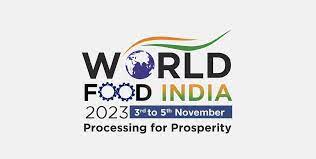
World Food India 2023
World Food India 2023
Important for Prelims:
World Food India 2023, Operation Greens, Market Access Initiative (MAI), National Horticulture Mission (NHM), e-NAM (National Agriculture Market), Organic Agriculture, Self Help Groups, Food Street, Food Basket of the World, International Year of Millets
Important for Mains:
Importance and challenges of food processing in India
November 7, 2023
Why in News:
The second edition of 'World Food India 2023' was inaugurated on November 3, 2023 at Bharat Mandapam in New Delhi, where the Prime Minister of India also distributed financial assistance for seeds to more than one lakh SHG members to strengthen the self-help groups.
- The first edition of World Food India was launched in the year 2017 by the Ministry of Food Processing Industries.
- Delegations from 14 countries including seven ministerial delegations participated in the event.
- This program had the special participation of Netherlands as partner country and Japan as focus country.
- The event aims to showcase India as the 'Food Hub of the World' and celebrate 2023 as the International Year of Millets.
- It is noteworthy that the United Nations has declared the year 2023 as the International Year of Millets (IYM 2023).
About World Food India 2023:
- World Food India 2023 is a gateway to the Indian food economy, facilitating partnerships between Indian and foreign investors.
- The World Food India event has emerged as a unique conference for manufacturers, producers, food processors, investors, policy makers and organizations across the global food ecosystem.
MASCOT:
- Millind (a probot) is the mascot of World Food India 2023.
Sunrise Sector:
- Due to the good results of World Food India, the food processing sector is called 'Sunrise Sector'.
Significance:
- India can take advantage of Sree Anna (millet) which is a super food globally.
- Millet can enhance food security, nutritional security and sustainability in the face of global challenges such as climate change, population growth and malnutrition.
- India can play the role of global leader in the field of food processing.
- To achieve this vision, India will be able to promote its supporters who want to reap economic benefits in the Indian food processing sector.
- One of the key enablers is to finance agri-food value chains and provide adequate and affordable credit to the food processing sector, especially micro, small and medium enterprises (MSMEs).
India's status in food processing sector:
- India is one of the world's largest food producers and consumers.
- India is the world leader in the production of milk, banana, mango, papaya, guava, ginger, okra and buffalo meat, second in the production of rice, wheat, potato, garlic, cashew.
- Foreign investment: According to government data, the sector has attracted foreign direct investment of more than Rs 50,000 crore in the last nine years thanks to the government's farmer-centric policies and favorable environment.
- Production-Linked Incentives: Many new dimensions have been achieved under the Production-Linked Incentive (PLI) scheme in the food processing sector.
- Agri-Infra Fund: Under this fund, an investment of more than Rs 50,000 crore is expected to undertake several infrastructure projects in the food processing sector.
- Through this fund, investment worth thousands of crores of rupees is encouraged in processing infrastructure in the fisheries and animal husbandry sector.
Major challenges facing food processing in India
- Lack of important infrastructure facilities:
- Lack of national highway is a major hindrance in this industry.
- At present national highways constitute only 2 percent of the total roads.
- There is lack of dedicated freight corridor.
- Insufficient number and capacity of cold storage and warehouse.
- Lack of a comprehensive national policy in the field of food processing.
- There is confusion due to many discrepancies in state level and central laws.
- There is lack of advanced laboratories and not enough modern equipment for testing food items.
- Due to lack of uniformity in testing standards, there is a situation of contradiction in the testing results.
- Lack of trained human resources and modern technology and use of old techniques.
- Lack of innovation in the food processing industry due to lack of research and development.
Government initiatives for upliftment of food processing sector:
- Formulation of agricultural export policy
- Operation Greens
- Market Access Initiative (MAI)
- National Horticulture Mission (NHM)
- e-NAM (National Agriculture Market)
- APEDA (Agricultural and Processed Food Products Export Development Authority)
- Establishment of Agricultural Export Zones (AEZ)
- Promotion of organic farming
- Nationwide logistics and infrastructure development
- Establishment of district-level centers
- Expansion of Mega Food Park
- Pradhan Mantri Kisan Sampada Yojana
- Micro Food Processing Enterprise Scheme
Conclusion:
Long term policies related to agriculture should be implemented by the Central Government to promote agricultural exports and welfare of farmers in India.
Source: PIB
-------------------------------------------
Mains Exam Question
Highlighting the importance of World Food India in the Indian food processing sector, discuss the major challenges facing this sector in India.